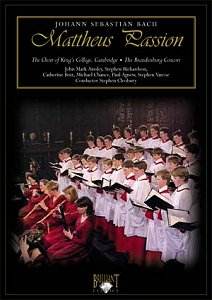Bach's St Matthew Passion has often been called the
greatest western musical work ever written. Don't expect this reviewer
to disagree - it never fails to move me, and to delight me by its beautiful
and often painful melodies. First performed on Good Friday 1727, it
is Bach's most complex vocal work, calling for two choirs and two orchestras,
and containing some of his most demanding arias. Performed often, since
Felix Mendelssohn "rediscovered" it in 1829 (performing a partial version
of the work), the St Matthew Passion was largely responsible for the
Bach revival of the 19th century. The work itself follows the text of
the Passion according to St Matthew, in a series of choral movements,
arias and recitatives. This is a long work - usually running around
2.30 to 3 hours, depending on the tempi chosen, which can be very tiring
to perform, especially for the soloists, who are up against some difficult
challenges in the arias.
The market is full of great recordings of the St Matthew
Passion, from classics by Richter and Leonhardt, to more recent recordings,
such as the second version recently released by both Herreweghe and
Harnoncourt, as well as the recording by Suzuki, but filmed versions
are few. This DVD shows the work being performed in the beautiful King’s
College Chapel.
Evangelist Rogers Covey-Crump is not totally convincing
- it is difficult to measure up to the benchmark of the magnificent
Peter Schreier, who is undoubtedly the perfect voice for the part (or,
at least, whose voice has become more or less identified with it). His
diction sounds a bit unsteady, and his voice seems just a bit too laid
back for this central part. Alto Michael Chance has a fine voice, but
uses a bit too much vibrato at times, which tends to distract from the
melody, calling attention to itself. Yet his vibrato is unequal - at
times it is intrusive and other times (even within the same aria) it
is subtle.
Curiously, Emma Kirkby, who does not often overuse
vibrato, does so here. Her voice is wonderful, as usual, but one may
question this vibrato that tends to stand out. However, in the heart-rending
aria Erbame dich for soprano and violin obbligato, she is more
restrained, and is truly magnificent. Yet it is hard to compare her
version to the near-perfect performance by René Jacobs on the
Gustav Leonhardt recording of 1989, or Robin Blaze's crystalline performance
on the Maasaki Suzuki recording. (Or even alto Michael Chance, present
on this recording, who was acclaimed for his performance of this aria
in the recent recording by John Eliot Gardiner.)
Regarding the sound of the recording some comments
must be made. The soloists are spread out across the space, which can
be a bit disconcerting, especially when camera angles change. There
is also something wrong with the balance. One hears the choir spread
out across the soundscape at times, but the orchestra is leaning to
the right, as is the choir at certain times. (This could be a problem
with my listening to it in Dolby 2.0 format; Dolby 5.1 is also available,
but I do not have the equipment to reproduce that type of sound. When
choosing the 5.1 setting on my equipment, nothing changes.) There is
also a very clear hiss at the beginning of each section, which is a
bit annoying.
Unlike the CD recording of this work, the DVD suffers
from sound problems that make it unacceptable. The unbalanced sound
of the orchestra and choir is far too distracting for this to be enjoyable.
Kirk McElhearn


